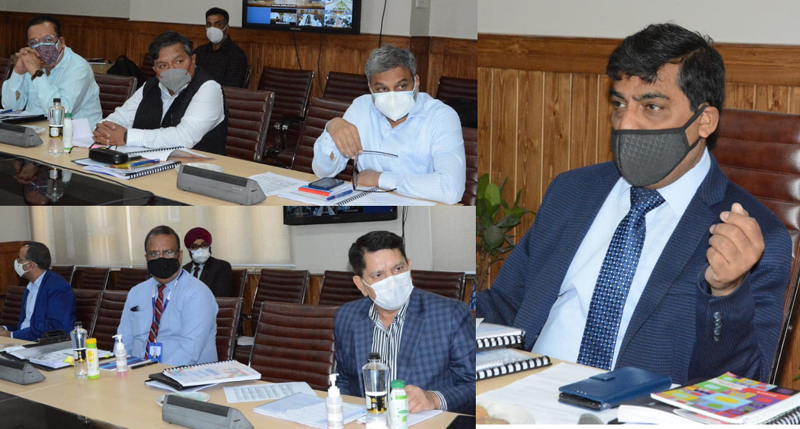*Directs banks to ensure disposal of loan cases in 15 days
Excelsior Correspondent
SRINAGAR, June 23: The Chief Secretary, Dr. Arun Kumar Mehta today chaired the 3rd UT-Level Bankers’ Committee meeting and reviewed achievements of banks and financial institutions operating in Jammu and Kashmir.
Principal Secretary, Revenue Shaleen Kabra, Principal Secretary, HUDD Dheeraj Gupta, Principal Secretary AP&FW Navin Kumar Choudhary, Principal Secretary, I&C Ranjan Prakash Thakur, Chairman & MD J&K Bank (Convenor J&K UTLBC) R K Chhibber. Regional Director, Reserve Bank of India (RBI) Kamal P. Patnaik, Director, DFS, MoF (GoI) A K Dogra, and other senior functionaries of the Government, RBI, NABARD, Banks, LDMs, line departments, insurance companies, BSNL were also present on the occasion.
In his opening remarks, the Chief Secretary, Dr. Arun Kumar Mehta said that the Central Government has approved a massive industrial package of Rs. 28,400 crore which aims at boosting the economy of the Union Territory by providing employment opportunities to the youth. This package is in addition to the existing funds provided by the Government of Jammu and Kashmir. “The UT Government has announced 14 sector-specific industrial policies for optimal utilization of the said industrial package”, Dr. Mehta said.
The Chief Secretary underlined the importance of Mission Youth in providing self-employment to 50,000 young entrepreneurs. He asked the banks to play pro-active role in realizing the objectives of the programme.
Reviewing the performance of banking sector in 2020-21, the Chief Secretary expressed his serious concern in poor lending to the priority sector in general and agriculture sector in particular despite immense potential in these sectors.
He asked the Reserve Bank of India to review the status and reverse the trend so that the credit flow is achieved as per the laid norms of maintaining 60% Credit Deposit Ratio with 40% credit to priority sector which includes agriculture, MSME, export credit, education, housing, social infrastructure and renewable energy.
Emphasizing the importance of horticulture-based industries in generating employment in Kashmir valley, the Chief Secretary asked banks to prioritize sanctioning of cases under PM Formalization of Micro Food Processing Enterprises Scheme to extend Rs. 100 crore credit over next 5 years towards development of enterprises based on ‘One District One Product’ model.
Under the PM Street Vendor’s Atma Nirbhar Nidhi (PM SVANidhi) scheme, the Housing and Urban Development Department was directed to develop 10,000 vending stalls in collaboration with banks as model kiosks based on common design and outlook in twin cities of Jammu and Srinagar during this financial year.
The banks were asked to pay special attention to lending to the poorest of the poor under Joint Liability Farming Groups of ‘Bhoomi Heen Kissan’. They were further asked to promptly process KCC loan cases without causing unnecessary delays to address the seasonal financial requirements of farmers.
The meeting was informed that the banks operating in Jammu & Kashmir have extended a total credit of Rs.30,688.49 crore in favour of 12,36,419 beneficiaries registering an achievement of 69% in financial terms and 80% in physical terms during 2020-21; against the Annual Credit Plan of Rs.44,630.02 crore for 15,37,993 beneficiaries.
To streamline sanctioning of loans by various banks, the Chief Secretary directed disposal of all loan cases within a period of 15 days. He further directed the Revenue Department to complete the scanning of land record by 15th August, 2021 so that verification of revenue documents can be undertaken by banks online to cut delays in sanctioning of credit cases.
The Chief Secretary asked banking sector to open new bank touch points in rural and far flung areas of Jammu and Kashmir by installing connectivity under Bharat Broadband Network through BSNL, besides exploring possibilities of adopting VSAT technologies. Banks were also asked to undertake intensive campaign of financial inclusion to promote financial literacy among rural masses. Banks were further asked to ensure display of scheme information through hoardings at all prominent places as a part of robust IEC activities.


